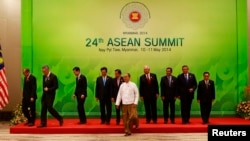Maritime tensions dominated a meeting of Southeast Asian leaders Sunday in Burma, also known as Myanmar, with Vietnam calling on its neighbors for support in their territorial dispute with China.
Tensions rose last week following China's controversial decision to move an oil drilling rig into waters also claimed by Hanoi.
Vietnam's deputy foreign minister Pham Quang Vinh called for China to remove the rig.
"For us, Vietnam, we consistently are persevering in our contacts with the Chinese side at all levels in order to resolve this issue and in order to request China to withdraw their ships and their oil rig," he said.
In its final statement Sunday, leaders from the Association of Southeast Asian Nations expressed concern and called for restraint by all parties involved in the maritime disputes. ASEAN, which appeared unwilling to risk antagonizing China, also said it was satisfied with talks on the issue.
The confrontation over the Paracel islands has raised fears of growing tensions between the China and Vietnam.
Hundreds of Vietnamese rallied in the country's biggest cities on Sunday to denounce China, in rare protests that looked likely to prolong the tense stand-off.
Speaking to fellow leaders of the Association of Southeast Asian Nations at a summit in Myanmar, Prime Minister Nguyen Tan Dung said Vietnam had acted with “utmost restraint” and used all means of dialogue to request China remove the rig.
“But until now, China not only hasn't responded to Vietnam's rightful request but also slandered and blamed Vietnam while increasing their violations, which are becoming more dangerous and serious,” he said, in his strongest comments yet on the crisis.
Dung also urged ASEAN and other nations to “support the legal and legitimate requirements of Vietnam.”
China has accused Vietnam of intentionally colliding with its ships in the South China Sea, after Vietnam asserted that Chinese vessels used water cannons and rammed eight of its vessels at the weekend near an oil rig.
Neither Burmese President Thein Sein's opening speech nor the final statement of the summit on Sunday touched on the China-Vietnam dispute.
China's foreign ministry, in a statement late on Saturday, said the issue was not “a problem between China and ASEAN” and that it opposed certain member states trying to use it to sow discord.
“The Chinese side is always opposed to certain countries' attempts to use the South Sea issue to harm the overall friendship and cooperation between China and the ASEAN,” the statement read.
China was ready to work with ASEAN to continue implementing the Declaration on the Conduct of Parties in the South China Sea, a statement that was agreed in 2002 to try to manage tensions in the seas, the ministry added.
China has begun official talks with ASEAN to establish maritime conduct rules for the South China Sea, but argues that territorial disputes should be discussed on a bilateral basis. It claims the entire South China Sea, putting it in conflict with Taiwan, Vietnam, the Philippines, Malaysia, and Brunei. The last four are ASEAN members.
Some information in this report was contributed by Reuters.
Tensions rose last week following China's controversial decision to move an oil drilling rig into waters also claimed by Hanoi.
Vietnam's deputy foreign minister Pham Quang Vinh called for China to remove the rig.
"For us, Vietnam, we consistently are persevering in our contacts with the Chinese side at all levels in order to resolve this issue and in order to request China to withdraw their ships and their oil rig," he said.
In its final statement Sunday, leaders from the Association of Southeast Asian Nations expressed concern and called for restraint by all parties involved in the maritime disputes. ASEAN, which appeared unwilling to risk antagonizing China, also said it was satisfied with talks on the issue.
The confrontation over the Paracel islands has raised fears of growing tensions between the China and Vietnam.
Hundreds of Vietnamese rallied in the country's biggest cities on Sunday to denounce China, in rare protests that looked likely to prolong the tense stand-off.
Speaking to fellow leaders of the Association of Southeast Asian Nations at a summit in Myanmar, Prime Minister Nguyen Tan Dung said Vietnam had acted with “utmost restraint” and used all means of dialogue to request China remove the rig.
“But until now, China not only hasn't responded to Vietnam's rightful request but also slandered and blamed Vietnam while increasing their violations, which are becoming more dangerous and serious,” he said, in his strongest comments yet on the crisis.
Dung also urged ASEAN and other nations to “support the legal and legitimate requirements of Vietnam.”
China has accused Vietnam of intentionally colliding with its ships in the South China Sea, after Vietnam asserted that Chinese vessels used water cannons and rammed eight of its vessels at the weekend near an oil rig.
Neither Burmese President Thein Sein's opening speech nor the final statement of the summit on Sunday touched on the China-Vietnam dispute.
China's foreign ministry, in a statement late on Saturday, said the issue was not “a problem between China and ASEAN” and that it opposed certain member states trying to use it to sow discord.
“The Chinese side is always opposed to certain countries' attempts to use the South Sea issue to harm the overall friendship and cooperation between China and the ASEAN,” the statement read.
China was ready to work with ASEAN to continue implementing the Declaration on the Conduct of Parties in the South China Sea, a statement that was agreed in 2002 to try to manage tensions in the seas, the ministry added.
China has begun official talks with ASEAN to establish maritime conduct rules for the South China Sea, but argues that territorial disputes should be discussed on a bilateral basis. It claims the entire South China Sea, putting it in conflict with Taiwan, Vietnam, the Philippines, Malaysia, and Brunei. The last four are ASEAN members.
Some information in this report was contributed by Reuters.







